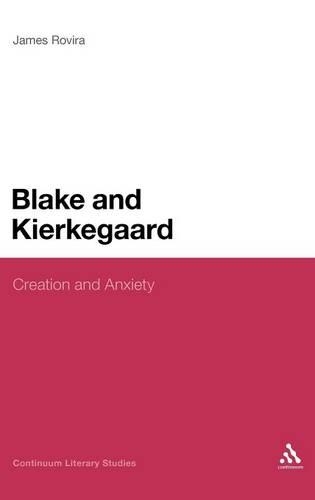
Blake and Kierkegaard: Creation and Anxiety
(Hardback)
Available Formats
Publishing Details
Blake and Kierkegaard: Creation and Anxiety
By (Author) Dr James Rovira
Continuum Publishing Corporation
Continuum Publishing Corporation
26th April 2010
United States
Classifications
Tertiary Education
Non Fiction
Literary studies: c 1800 to c 1900
Philosophical traditions and schools of thought
821.7
Physical Properties
Hardback
208
Width 162mm, Height 238mm, Spine 16mm
Description
Reviews
Blake and Kierkegaard speak from the same instinct of the human condition and of man's states of anxiety and self-awareness. James Rovira offers a highly nuanced comparative reading of both author's concepts, of innocence and experience, creation and fall, that not only enhances our understanding of the works under consideration but affirms their abiding and life-affirming relevance to modern thought. -- Michael Phillips, Centre for Eighteenth Century Studies, University of York, UK
Rovira's book is an involved but extremely rewarding book, one that delves fully into the complex and sophisticated dialectical processes involved in Kierkegaard's thought... Blake and Kierkegaard as a whole is a carefully thought-through and argued text.' -- zoamorphosis.com
"Rovira's comparative study of William Blake and Sren Kierkegaard offers fresh perspectives related to both thinkers in their shared sociocultural moment. Rovira (English, Tiffin Univ.) frames his inquiry within creation anxiety--i.e., the persistent idea that creations will ultimately turn against one in destructive ways. The author makes connections between Frankenstein, Metropolis, and the Matrix trilogy in order to justify the persistence of this anxiety through the last 200 years and to imply that the apprehensions that impacted Blake's and Kierkegaard's thinking--apprehensions resulting from tensions between democracy and monarchy, science and religion, nature and artifice--apply today. Rovira compares and contrasts ideas relating to the progressive development of the subject to show how both resisted mechanistic Enlightenment psychologies that led to creation anxiety: in Blake's case, from innocence through experience toward visionary perspectives; in Kierkegaard's, the differentiation of self from natural, social, and mental environment. Accessible yet provocative, this book makes a significant contribution and offers critical challenges to the scholarship surrounding both figures, and close readings (and re-readings) expose lingering tensions between self and subjectivity. Generous notes and a substantial comprehensive bibliography round out this excellent study. Summing Up: Essential. Lower-division undergraduates and above. -- J. A. Saklofske, Acadia University"- CHOICE
In Blake and Kierkegaard: Creation and Anxiety, Rovira shows much skill in handling both writers on the basis of the comparative premises he sets up. The comparative strategy is a stimulating devicethe author proves that there is something to be gained from translating Blakean terms into Kierkegaardian concepts. Through Kierkegaard, we are provided with a fresh sense of how another thinkers conceptual structures can be used to clarify Blakes often perplexing mythology. -- Robert W. Rix, University of Aalborg, Denmark * Comparative Literature Studies, Vol. 49, No. 3 *
Author Bio
James Rovira is Assistant Professor of English at Tiffin University, Ohio, USA.
